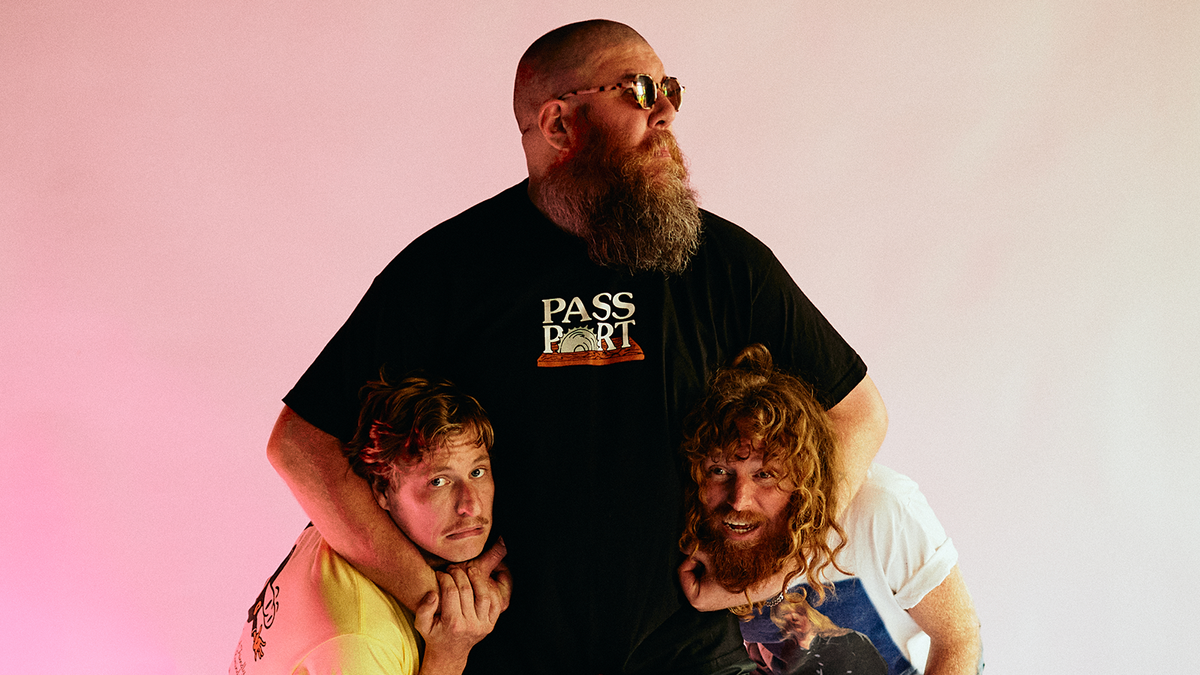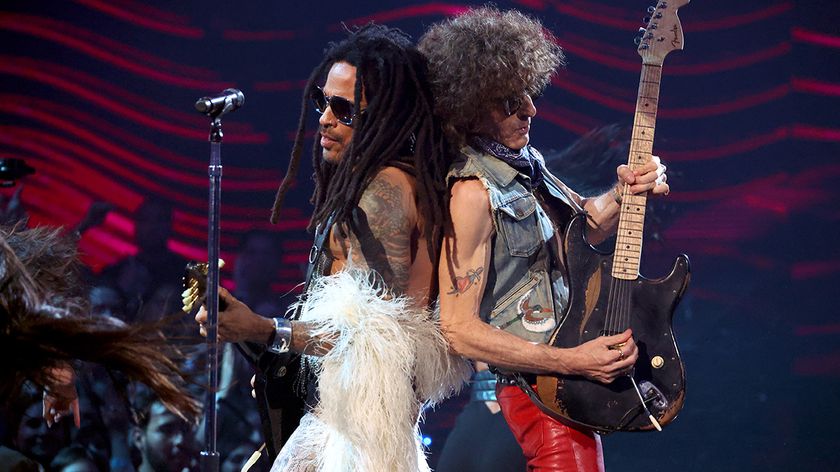Totally Unicorn: “Who doesn’t want to see a bunch of pasty white boys in their thirties trying to be sexy?”
The world is more f***ed now than ever, so on album #3, Totally Unicorn enter a whole new dimension of math-punk calamity to counter it.

You’ll never quite remember your first time seeing Totally Unicorn live – chalk it down to intoxication, or all the crowd-surfers’ boots you’ll cop to the noggin – but there’ll always be a lingering sense that it was one of the best goddamn sets you’ve ever seen a band play. And you’ll be right: infectious is the sheer visceral intensity of frontman Drew Gardner, both vocally and in his movement, thrashing around the stage (and in the crowd) like Satan himself is trying to burst free from his stomach. Mesmerising is Aaron Streatfeild, battering away at his fretboard on grisly, guttural riffs like his strings owe him money – not to say the least about his and drummer Adam Myers’ pure disregard for traditional time signatures.
For their third album, High Spirits//Low Life – crafted in the time of COVID-19, when the prospects of taking to a stage were no less than dismal – Totally Unicorn took a step back and honed in more on how their songs sounded through headphones, rather than amp stacks. It’s something they’d always endeavoured to do, Streatfeild tells Australian Guitar, but with more time, more money and more turmoil to mine for great songwriting, they were able to pull it off without a hitch.
Ultimately, High Spirits//Low Life is an apt title for the record: it shows the band in their most energised form to date, playing wickedly fun songs about punishingly bleak songs (whether they be personal, political, or somewhere in the middle).
With all the f***ed-up shit going on right now, how did you find the motivation to get back into the studio?
I mean, we’ve all gotten so invested in [this band], so we didn’t have much of a choice. I mean, it’s an expensive process, recording an album. It was hard for me because my head was elsewhere – I had some personal stuff happen halfway through the recording, and it was trick. But I suppose in times like that, having something something to focus on, other than the absolute bin fire that is your life, it helps. It sucks when it finishes, though, because you have to come back to your crushing reality. But y’know, we all do this thing as a labour of love – we’re all over 30 and we’re still trying to make music, purely because we enjoy doing it. Playing music is one of the best things you can do – especially when you’re doing it with your friends.
Do you find that you’re able to channel all of those emotions into the music you write?
Yeah, for sure. That’s one of the things I always try to give myself some gratitude for – although we don’t get to make a living off our music, we’ve still got our foot in reality, and that can fuel whatever music you make. That’s our biggest influence, really. Drew always talks about it in his lyrics – about his day job that he hates – and I do it when I’m writing guitar parts because a lot of the time, that’s how I get into my zone: I sit and dwell in whatever I’m dwelling in at the time, and sort of start building some chords from that.
Emotion really determines what kind of music I write; every time I’ve tried to be like, “I want to do this kind of thing,” it’s turned out shit. So I just stick to whatever my muse is at the time, I suppose, whatever drama is going on, or life issue – which, y’know, I seem to have no shortage of them, so…
I feel like it’s not a stretch to say that Totally Unicorn are a gig-centric band, first and foremost. But in a pandemic, when the touring landscape is unpredictable at best, do you have to rethink your approach to songwriting?
Well over the years, we’ve wanted to try to write more songs that would do us more of a favour in the listening sense. A lot of the songs are great for a live show, when people are drunk and and carrying on – and that certainly works well – but I think we kind of wanted to try something a little more impactful.
Get The Pick Newsletter
All the latest guitar news, interviews, lessons, reviews, deals and more, direct to your inbox!
Writing simple songs is really hard, y’know? Writing a million riffs in a song – that’s still difficult, I’m not shitting on that at all, but trying to write a short, concise song is really difficult. But that’s what we wanted to try to do. We were like, “Alright,
we’ve got our live game up, that’s really good – now let’s try to lift up the other end, let’s do some songs that people want to listen to.” We don’t always want to be the sad clowns dancing in the pub for everyone’s enjoyment.
How do you find that sweet spot with a riff that is f***ed-up brutal, but also melodic and danceable?
As I’ve gotten older, I’ve realised that I don’t want to do much of that math-y kind of stuff – mainly because, I don’t know, I really love a nice groove, and I love something that makes me want to shake my thing when I’m playing it. It’s always a good sign when you can feel it in the room while it’s happening. Myer’s really good at the math-rock thing, but I think his real strength is coming up with those really nice and sexy grooves. I think ‘sexy’ is what I wanted to do a bit more of this time around. Who doesn’t want to see a bunch of pasty white boys in their thirties trying to be sexy?
Speaking of sexy, what are the secret weapons on your pedalboard right now?
I think last time we spoke, I was complaining about how broke I was all the time. But since then I’ve stopped drinking, so I’d saved up a bit of money. I also got a better job as well, so I’ve got a little more cash. So I bought a couple of really cool things. Some of them I didn’t use on the record because I got them after we made it, but they all emulate everything on record really well. I’ve got that 1981 Inventions distortion – I usually use a [ProCo] Rat, but I didn’t actually use that on this record.
The 1981 is the perfect Instagram pedal. It looks really cool, but it actually sounds really good as well. So I’ve got that in the Marshall, and that’s great. It’s kind of like a Rat but it’s not as hairy or wolfy – I can maybe scoop it a little bit and get a bit more chugg out of it. One of the really secret ones, which is embedded throughout all the songs on this record, is another hipster pedal: a Montreal Assembly Your And You’re. Jimmy [Balderston] – who recorded our last album, Sorry – had one, and he was like, “You got to give this thing a go – when it’s not on, it just makes noise, and it sounds like someone’s tearing paper.” And I was just like, “Yep, sign me up.”
It has a bit of a HM-2-y thing to it. It’s the noisiest thing in the world – as soon as you turn it on, it’s just like, “GRATATATATATATAT!” – which I think is the thing you probably hear at the end of ‘Weekend Warrior’. But it’s cool. And paired with a much cleaner tone, it’s mad. If you a play it by itself, it hasn’t got a whole lot of definition, but with the bass and the drums and then a cleaner guitar over the top of it, it’s magical

Ellie Robinson is an Australian writer, editor and dog enthusiast with a keen ear for pop-rock and a keen tongue for actual Pop Rocks. Her bylines include music rag staples like NME, BLUNT, Mixdown and, of course, Australian Guitar (where she also serves as Editor-at-Large), but also less expected fare like TV Soap and Snowboarding Australia. Her go-to guitar is a Fender Player Tele, which, controversially, she only picked up after she'd joined the team at Australian Guitar. Before then, Ellie was a keyboardist – thankfully, the AG crew helped her see the light…
- Ellie RobinsonEditor-at-Large, Australian Guitar Magazine

“We had 15 minutes left, and it was time to go… I just started playing that riff. Then Lenny goes, ‘Whoa, what’s that?’” Lenny Kravitz guitarist Craig Ross reveals the serendipitous roots of a Kravitz classic

“The concept of the guitar duel at the end was just appalling”: Crossroads is an essential piece of '80s guitar lore, but not every guitar legend was a fan of the film








